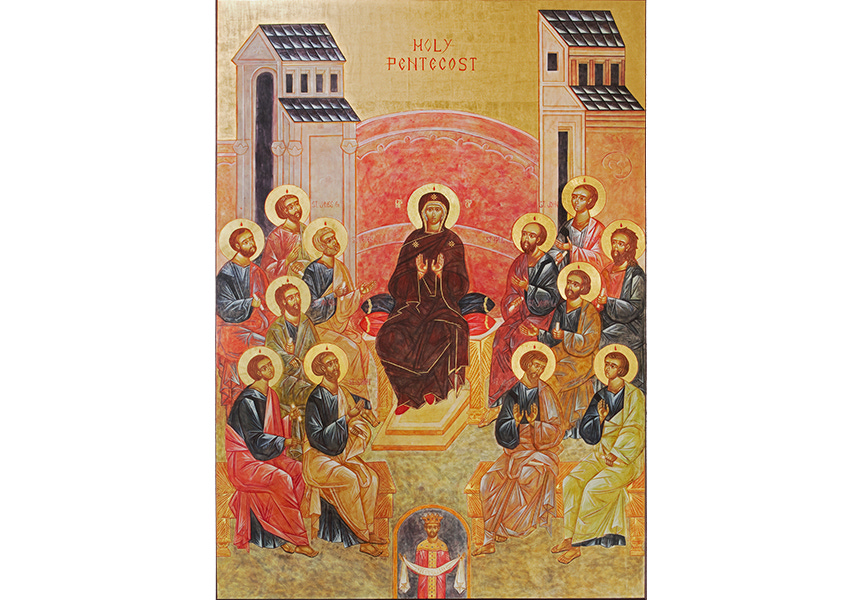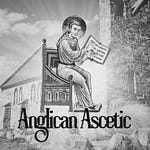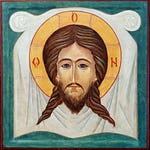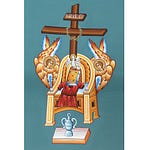And so the womb of the Upper Room went boom. To those that believe in Christ, to those who abide in Him, to those who keep His commandments, Jesus said “The Holy Spirit, whom the Father will send in my name, he will teach you all things and bring to your remembrance all that I have said to you.” The hearts, and mind, of the Upper Room apostles were full of the Holy Spirit, full of Christ, full of the Father. They had all become like Blessed Mary at the Annunciation: full of grace because their souls were overshadowed, their hearts illumined by the Holy Spirit, because in their nine days of religion in the Upper Room with one accord having devoted themselves to prayer, they had conceived the holy Jesus in their hearts, they had bore Christ in their mind. Having been told by Jesus to wait in the Upper Room to receive the Holy Spirit, on Pentecost He came in all power: in staggeringly explosive energy: the womb of the Upper Room had done gone boom.
The Holy Spirit is the promise of the Father, and proceeds from the Father: proceeds, that is, from the He Who is the maker of heaven and earth, and of all things visible and invisible. The Holy Spirit, the Lord and Giver of Life at Pentecost comes and gives life to the Church. Without the Holy Spirit, there is no Church, for without Him we walk not in light, but in darkness, confusion, and alienation. As S. Paul says, it all depends on what our mind is set: to set the mind on the flesh is death, Paul says; but to set the mind on the Spirit is life and peace. Because with the Holy Spirit, through His life and peace, we can see Christ, see Who He is, see the Father in Him, see His Victory over Satan, proclaim His Holy Name, and be remade inwardly by Him into His image.
This is all an incredible marvel, and absolutely astounding. With the Holy Spirit, the life of the Church is revealed publicly. This Church is not some mere social assembly of persons who share common social interests, but rather is the Body of Christ, animated by the Holy Spirit, called to manifest divine love in the world. And this Body it is that Christ ordained to continue what began in Him: He ordained them to continue to do the works that Christ does, His ministry of reconciliation; to continue His ministry of transformation through repentance and illumination; to continue His ministry of drawing all people to Himself. This Body: the 120 apostles of the Upper Room Church, which, through the nine days together in one accord in prayer, were born into the world. And this Body proclaims, as Saint Peter did in his Pentecost preaching, that Jesus Christ the Crucified One is also Jesus Christ the Resurrected One, and that this Jesus is Lord and Christ, the one revealed through the opening of Scripture and the breaking of bread.
Pentecost is described in the 110th Psalm: “In the day of Thy power shall Thy people offer themselves willingly with a holy worship: Thy young men come to Thee as dew from the womb of the morning.” That womb of the morning is the Upper Room, endued with the anointing oil of the Holy Spirit, the 120 apostles and then the 3,000 souls baptized that day given the power of the Holy Spirit to offer themselves willingly with a holy worship to Christ. To find Pentecost itself described in the Old Testament itself is a great wonder that unwinds chronological time. Finding Christ in the Old Testament (in Scripture) and finding Him in the Breaking of Bread is what the Church does because Jesus taught His Church this very thing; eating Christ in Word and Sacrament fundamentally defines the Christian Church, and gives the Church its identity.
Stating these as necessary fundamentals is no overstatement: it is seen in the New Testament directly from Saint Luke’s hand. That at Pentecost, the life of the Church was revealed, and that life is continuing in what began in the Upper Room: continuing, that is, steadfastly in the apostles’ teaching and fellowship, in the breaking of bread, and in the prayers. Christianity is this religion. Christianity is Pentecost, and Jesus Christ, Who in giving His life for us trampled down death by death and upon those in the tomb bestowed life, expects of His Bride to continue in His abundant, pentecostal life through the apostles’ teaching and fellowship, the breaking of bread, and in the prayers.
The Church is really a continuous Pentecost, and the life of a Christian is a continual initiation into the reality of Pentecost which is the Church. The Day of Pentecost is the Day in which we live and move and have our being within the Holy Spirit. The Holy Spirit constitutes the Church as the Body of Christ, and thereby bears witness to and makes known through the opening of Scriptures and breaking of bread Jesus Christ the Crucified and Resurrected One; so that the Father can be revealed through Christ and only through Christ. And so to receive the Holy Spirit is to be continually inspired by His power shown through the Upper Room Saints, to our all our worship as joining into theirs, and through communion with them (by their guidance and example) growing in holy fear which is the beginning of wisdom, embracing the religion revealed on Pentecost as the means by which we yearn for the spiritual milk of the Word – to receive the Holy Spirit happens as we allow our hearts to dwell always in the Upper Room: to receive the Holy Spirit and be filled ever-more by Him; that our sense of Christ’s ascended presence is transparent, unmistakable, and living. And that we not merely say, but truly know, ourselves to be led by the Spirit of God, and hence truly Sons of God, who yearn for the spiritual milk of Christ, that our illumined hearts may truly be on fire; on fire because of Our Lord Christ Jesus dwells in us: He Who lives and reigns with the Father in the unity of the Holy Ghost, ever one God, world without end. Amen.











Share this post